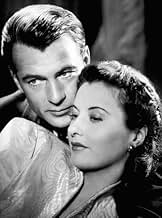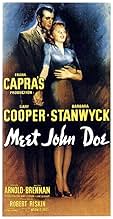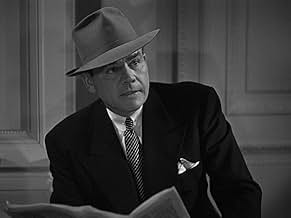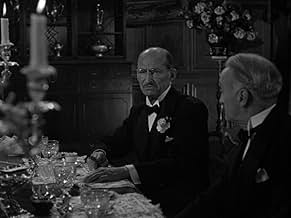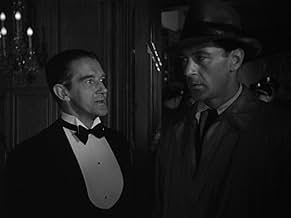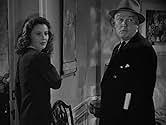Als eine Art Abschiedsgeschenk druckt die Reporterin Ann Mitchell einen erfundenen Brief des Arbeitslosen 'John Doe', der damit droht, sich aus Protest gegen die sozialen Missstände umzubrin... Alles lesenAls eine Art Abschiedsgeschenk druckt die Reporterin Ann Mitchell einen erfundenen Brief des Arbeitslosen 'John Doe', der damit droht, sich aus Protest gegen die sozialen Missstände umzubringen.Als eine Art Abschiedsgeschenk druckt die Reporterin Ann Mitchell einen erfundenen Brief des Arbeitslosen 'John Doe', der damit droht, sich aus Protest gegen die sozialen Missstände umzubringen.
- Für 1 Oscar nominiert
- 4 Gewinne & 1 Nominierung insgesamt
- Charlie Dawson
- (as Charles Wilson)
Struggling columnist Ann Mitchell (the incomparable Barbara Stanwyck) is one of many about to receive their walking papers as the latest casualties of a newspaper takeover. Learning that her dismissal is in part due to a writing style that lacks bite, she vents her anger on her last assignment, fabricating and printing a somber, biting `John Doe' letter. `Written' by a despairing, unemployed man, who, tired of life's indignities, has given up on an indifferent, capitalistic society, the writer vows to throw himself off the top of City Hall on Christmas Eve.
Ann's last column sparks a major outpouring of varying concern, not only from top government officials, but from newspaper competitors who claims the piece is a work of fiction designed to promote sales subscriptions, and from the public who are genuinely moved by this man's plight. Caught between a rock and a hard place, the new editor-in-chief (James Gleason, in a marvelous turn) reluctantly keeps Ann on the payroll (with a bonus) while deciding to run with the story. Auditioning indigent men to lend a face to their `John Doe,' they find their man in 'Long John' Willoughby (played to perfection by Gary Cooper), an ex-baseball player who has fallen on hard times. Willoughby becomes an instant celebrity and an identifiable symbol of integrity and humanity. `John Doe' clubs soon start sprouting up all over the place promoting `good neighbor' policies. Trouble brews, however, when a ruthless financier (played with typical malice by Edward Arnold) agrees to sponsor `John Doe' appearances for radio and the lecture circuit, then threatens the movement by using it for his own political aspirations.
Cooper and Stanwyck are ideal in their top roles. Stanwyck is peerless when it comes to playing smart, gutsy gals. Here, she shows all sorts of vibrant colors as an assertive reporter trying desperately to climb up the newspaper ladder without getting her hands too dirty, trapped on both sides of the fence and playing both sides superbly. Coop too is deeply affecting, the epitome of the `aw shucks' kind of 'everyman' who manages to find a stirring, articulate voice underneath all that awkwardness and reticence. Nobody plays this kind of role better.
It helps too that the leads are surrounded by all-star character pros. James Gleason is marvelous as the frustrated editor who must wrestle with his conscience as the hoax he orchestrated gets seriously out of hand. He has one exquisitely tipsy scene in a bar with Coop where he lays all the cards out on the table. Regis Toomey, as a prime spokesperson for the "John Doe" movement, has a touching moment as he expresses the impact the club has made on his community. Edward Arnold is exemplary as the manipulating moneybags, and Walter Brennan's straightforward Colonel is insightful as Coop's obstinate buddy who sees his friend falling into the same opportunistic trappings he is supposedly rebelling against. The one veteran, scene-stealing player not up to snuff is Spring Byington, who is stuck on the bench in a rather benign, devoted mom role.
The only foul ball I found in this fast-paced, smooth-running story takes place atop the City Hall with an overly hysterical Stanwyck punching home Capra's idealism ad nauseum. It could have been more effective with a still strong but subtler set-up and approach. So, hey, it's not quite a shutout, but why quibble when the rest of the film is way ahead of the game.
Like the equally dark `It's a Wonderful Life,' Capra's genius is that he knows how to pitch and score the important points when necessary, not only with laughter and tears, but with unyielding hope and, most significantly, with words. It's more than any home crowd can ask for.
- gbrumburgh-1
- 16. Jan. 2002
- Permalink
Handlung
WUSSTEST DU SCHON:
- WissenswertesDirector Frank Capra didn't want anyone to play John Doe except Gary Cooper, who agreed to the part without reading a script for two reasons: he had enjoyed working with Capra on Mr. Deeds geht in die Stadt (1936), and he wanted to work with Barbara Stanwyck.
- PatzerAfter "John Doe" intrudes on D. B. Norton's dinner party and tells him off, Norton calls his newspaper and orders a special edition which will reveal Doe as a fraud. Doe takes a cab from Norton's house directly to the convention hall. Within minutes of his arrival there, a horde of newsboys appear with copies of the newspaper. It would be impossible to print an extra edition in such a short period of time. Correction: There isn't a plot hole, because D.B. Norton isn't saying nor implying that the newspaper will be printed from them on. He stated, before Ann is running after John Doe's in the Rain, "that he was prepared for this" and this does imply that the papers were already prepared, printed before. D.B. was a very rich man, callous, evil man. He foresaw all the problems in his investments.
- Zitate
Beany: What's a helot?
The Colonel: You've ever been broke, sonny?
Beany: Sure, mostly often.
The Colonel: All right. You're walking along, not a nickel in your jeans, you're free as the wind, nobody bothers ya. Hundreds of people pass you by in every line of business: shoes, hats, automobiles, radios, everything, and they're all nice lovable people and they lets you alone, is that right? Then you get a hold of some dough and what happens, all those nice sweet lovable people become helots, a lotta heels. They begin to creep up on ya, trying to sell ya something: they get long claws and they get a stranglehold on ya, and you squirm and you duck and you holler and you try to push them away but you haven't got the chance. They gots ya. First thing ya know you own things, a car for instance, now your whole life is messed up with alot more stuff: you get license fees and number plates and gas and oil and taxes and insurance and identification cards and letters and bills and flat tires and dents and traffic tickets and motorcycle cops and tickets and courtrooms and lawers and fines and... a million and one other things. What happens? You're not the free and happy guy you used to be. You need to have money to pay for all those things, so you go after what the other fellas got. There you are, you're a helot yourself.
- Alternative VersionenAlso available in a computer-colorized version.
- VerbindungenFeatured in The 54th Annual Academy Awards (1982)
- SoundtracksTHE BATTLE HYMN OF THE REPUBLIC
(1861) (uncredited)
Music by William Steffe
Lyrics by Julia Ward Howe
Performed by Hall Johnson Choir
Top-Auswahl
- How long is Meet John Doe?Powered by Alexa
Details
- Laufzeit2 Stunden 15 Minuten
- Farbe
- Seitenverhältnis
- 1.37 : 1
Zu dieser Seite beitragen





















